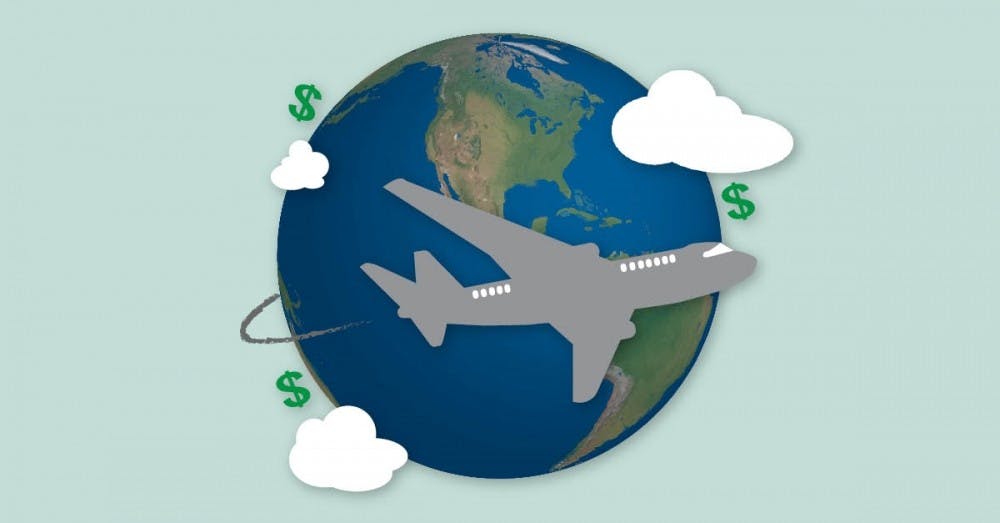Each year, the number of international students paying large amounts of money to study in the United States increases. About 975,000 international students studied at U.S. colleges and universities in 2014-15, according to Institute of International Education. The previous year, only about 886,000 international students studied in the United States. The U.S. is the most popular country for international students studying abroad. It is also one of the most expensive options.
In the U.S., the average cost to study at a public university is a little over $22,000 per year. Studying at a private university costs a little over $32,000 per year. This makes the U.S. the third most expensive country to study in, just after Singapore, ranked second, and Australia, ranked first. As part of the average costs, the U.S. claims first for the highest tuition prices, according to a Hongkong and Shanghai Banking Corporation study in 2014. There are also many more costs not included in this study, such as the costs of the application, book fees, travel, and even emotional costs. So why exactly do so many international students pay such a large amount of money to study in America?
Ball Bearings met with three people in order to gain opinions and insight pertaining to the costs of an international education: Mary Theresa Seig, director of the Intensive English Institute and associate professor of English at Ball State University, Jiaxuan Shang, a student from Wuhan, China, and Maria Skd, a student from Minsk, Belarus.
Ball Bearings: How do you believe international students benefit from studying here in the United States? What are the disadvantages?
Mary Theresa Seig: I think that any kind of acculturation, where someone learns to function in another culture, helps them to understand not only what they value and what’s important to them, but also helps them to see that there are other ways to think, and to live a life. You learn about yourself by learning, by coming up against a different cultural setting which allows you to question yourself and mature in a way that is hard to do if you hadn’t had that experience. The disadvantage, of course, is that acculturation is a complex, difficult process that is taxing. It’s psychologically difficult, it’s emotionally difficult, but I think it’s a worthwhile process to go through.
Jiaxuan Shang: I think that first, improving English is a benefit. In China we learn English too, but mostly it was taught by Chinese teachers, and here we can communicate with native speakers. We can learn real English, not by Chinese, Chinglish. We come here, and we can communicate with the students, teachers, and professors who come from all over the world, so that’s a benefit. The disadvantage is they’re far away from family, so that makes it kind of hard. The second disadvantage is that the language is a problem. We couldn’t understand the knowledge as quick as native speakers.
Maria Skd: I’m doing political science, and that’s a really cool chance to have a different approach to international relations. You get a whole bunch of different facts that you don’t really cover that much back home. Then you have a really cool chance to share your perspective with the people here, and it’s rare that they’ve met someone from Eastern European countries, let alone from Belarus. They have absolutely no clue what that is, so you promote your country, and you actually make people know it exists. I have not really noticed any disadvantages so far. It might be the food. It’s kind of manageable, but not the best you can imagine. Then you have to come back home at some point, and you have to experience what they call like a reverse culture shock. Once you’ve seen how it can be, and you come back and you’re like, well what’s next?
BB: Why do you believe it is hard for international students to afford college in America? What makes it easier?
MTS: It’s more expensive actually, for international students to study in the U.S. than it is for domestic students. Tuition is typically three times higher. I don’t know what makes it easier, but I do know that many international students who come to the U.S., are sponsored by someone in their family, or their government. That represents a commitment made by those governments, by those foundations, by those families as to the value of a U.S. education. They see it as investment in the future of their student.
JS: Many American students complain about that question. The tuition is expensive, the textbooks are expensive. All the stuff is very expensive. Also we have to convert the currency. So, one dollar here you can buy some snacks, but in China you can buy more.
MS: It’s expensive. It costs you a lot of money here. The rest is actually really easy. I mean, the actual studying process is not that hard. In Belarus, they want you to kind of know way more. Here, they mainly focus on some general ideas. Back in Belarus they want you to know everything in detail and you end up being lost. You have to put way more effort into your studies, and the knowledge is not necessarily better and deeper, though I hope it is.
To continue reading, visit ballbearingsmag.com






